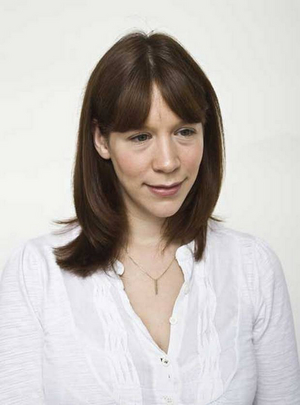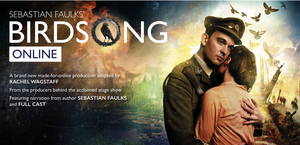Interview: Rachel Wagstaff Discusses Adapting BIRDSONG Into Digital Theatre

The Original Theatre Company are streaming a digital version of their touring production of Sebastian Faulks's Birdsong from 1-4 July. We talked to adaptor Rachel Wagstaff about her career, how the show has evolved, and what she thinks of the current situation with theatres in lockdown.
Could we start by talking a bit about your journey as a playwright? How did you become a writer and adaptor?
I loved reading as a child and then began to write my own stories and little plays - typical teenage stuff, I'm sure! I don't think I ever showed them to anyone. I began to get very interested in the literature of the First World War, particularly the poetry, and even tried to write poetry for a while. Again, never anything worth showing the world. Then, when I was 17, I read Birdsong and it meant so much to me, but I could also see the scenes described with startling clarity. I found myself idly wondering if one day I might be able to adapt it for the stage.
At university, I directed a few plays but I wasn't very good at that. I was much more interested in the text itself. Finally, my tutor, Lloyd Trott, persuaded me to write my own play for my dissertation. I wrote my first full-length play, The Soldier, which was put on at the Edinburgh Festival. It was about the last year in the life of Rupert Brooke (who died in 1915, on his way to Gallipoli). I absolutely loved researching and writing - and obsessively rewriting - it. But it was when I sat in the auditorium for the first performance and I and saw a row of otherwise unconnected human beings laughing and then crying at something I'd put together, I knew I had finally found what I really wanted to do with my life: to reach out to and move strangers.
A lot of digital theatre productions have been made available in the past few months: some original, others archive recordings (like your own Flowers for Mrs Harris from Chichester). Do you think it's been useful as a way for the industry to stay relevant or focussed?
I think it has really helped, and with all this free content pouring out, theatre has become incredibly popular and helpful during a very challenging time. I'm thrilled at just how many people saw Flowers for Mrs Harris all round the world, and the lovely reviews that emerged.
On the other hand, now many in the industry are facing bankruptcy - even our National Theatre cannot keep haemorrhaging money like this with no income - people have realised they will have to charge a small fee per viewing, to keep theatre and the livelihoods of so many afloat. I'm really pleased that the Original Theatre Company have paid every single actor and crew member Equity rates for this production and hope that people will support the very best new work emerging, and the theatre companies brave enough to spend money in a time when no income is guaranteed!
Birdsong is an extremely complex story to bring to life. What's been the biggest challenge in refocusing it for video?
Alastair Whatley [Original Theatre Company's Artistic Director] asked me to streamline it where possible - stripping down crowd scenes, for example, into more intimate scenes, even removing the occasional character or strand. The play has existed for so long, I was nervous about taking anything out in case it all unravelled, with every change or incision having a knock-on effect later in the piece. Having said that, I'm actually much happier with this streamlined version and would now keep many of the changes I've made for this version, should the play have a life again too.
In watching productions reimagined for the screen, I've been impressed by the attempts to make work cinematic; it seems like a vastly different discipline to traditional stage design. What should audiences look for in Birdsong?
I think there's a musicality to this new production that should help this new hybrid form - not mere archive footage of a play, but something created especially for the screen, though still a play at heart. Alastair Whatley and Charlotte Peters, our directors, have created an extraordinary atmosphere for each scene, with brilliant digital design (David Woodhead) and sound (Dominic Bilkey). I also think that having what cannot be shown narrated instead by the author of the book, Sebastian Faulks, adds a real weight and depth to this production, and that too will contribute to the musicality I mentioned which underpins the whole show.

What level of collaboration took place between you and Sebastian Faulks in developing the script for Birdsong? Do you find it easy to develop work from another medium and do you have a particular way of working through another person's text?
Sebastian was incredibly gracious from the very beginning - from his polite initial scepticism to his generous reaction to the first draft of my script. After that, he became increasingly more involved, giving notes on drafts and run-throughs, even playing a cameo role in the touring production several times for special performances. He is very supportive while never becoming obtrusive - the perfect combination!
I am very drawn to adapting work I love and transposing it to a different medium. Taking something already beautiful in one form and rendering it wholly alive in the mouths and bodies of living, breathing human beings, to be performed in a dark room of connected strangers. I find each piece demands its own way of working, but perhaps the real art comes in finding the best way of collaborating with the author of each piece, whether they're dead or alive, by digging deep to understand why the work meant so much to them that they had to write it - and to me, that I want to live with it for years.
This production is being released on the anniversary of the Battle of the Somme 104 years ago and is presented in association with the Royal British Legion. Do you feel that the lessons of past warfare are still as relevant today, and do you see any parallels with our current pandemic?
Part of the reason I was so drawn to Birdsong was because it captures so eloquently the horror and suffering that happened on an unprecedented scale, giving rise to an understanding of the real damage inflicted by warfare in a way that looking at mere statistics could never convey. Of course, I understand that there may be just causes for war, but by keeping Birdsong and other powerful war literature alive, I hope we also manage to keep strong the voice that cries out against conflict.
And I do see the parallels with our current pandemic: people all round the world suddenly thrown into turmoil and fear, economies crashing and civilisations suddenly destabilised. It's very alarming - fear of the virus itself, and fear of the repercussions of trying to quash it. Plus not knowing when or if it's ever going to end. I realise most of us aren't having to put ourselves on the front line in the way those young men did, but it's certainly anxiety-inducing, fearing for vulnerable loved ones, as well as all our livelihoods.
The theatre industry is facing immense challenges now. Do you think we need a rethink in the way productions and venues are financed, developed, and supported?
I totally understand that we can't open theatres until it's safe to do so, so I really hope that the government can find a way to support everyone within the industry through this, while we simultaneously fight to find our own ways through. Companies like the Original Theatre Company, who have the initiative to come up with, and turn around so quickly and brilliantly, a project like this, should be encouraged and financially supported to the hilt. I know theatre will be in real trouble when the furlough scheme ends in October, so I really hope that there is something in place by then to support industries that uniquely rely upon as many people as possible being close together in a confined space!
Finally, how have you been coping personally with lockdown? What have you missed the most?
Like many people, it's been up and down. I have young children, so have been one of millions enjoying the challenge of home schooling while also trying to work from home. I don't think anyone wins at that! It is wonderful having so much time with the children, but tricky balancing that with deadlines.
I miss everything I didn't fully appreciate before - from my friends, family and colleagues to unexpected things like playgrounds, trains and the buzz of walking through the crowded streets of London and feeling part of something bigger than myself. I didn't realise or understand how rich in freedoms we were here, and I will never, never take that for granted again!
Birdsong tickets are available on the Original Theatre Company website from £10
Watch the trailer below!
Comments

Videos


